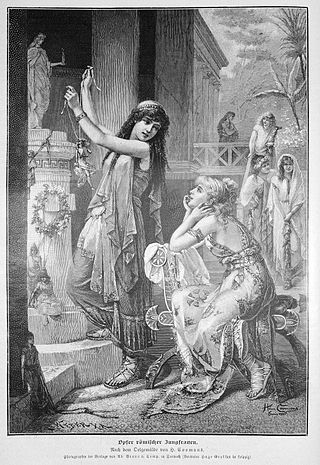
Paganism is a term first used in the fourth century by early Christians for people in the Roman Empire who practiced polytheism, or ethnic religions other than Judaism. In the time of the Roman Empire, individuals fell into the pagan class either because they were increasingly rural and provincial relative to the Christian population, or because they were not milites Christi. Alternative terms used in Christian texts were hellene, gentile, and heathen. Ritual sacrifice was an integral part of ancient Graeco-Roman religion and was regarded as an indication of whether a person was pagan or Christian. Paganism has broadly connoted the "religion of the peasantry".
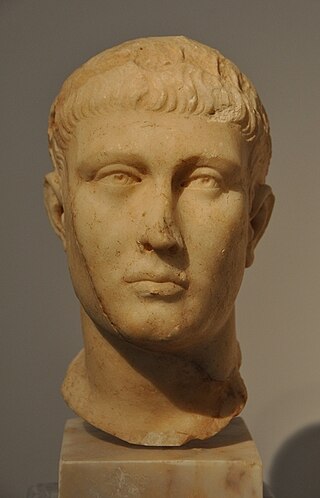
Theodosius I, also called Theodosius the Great, was a Roman emperor from 379 to 395. During his reign, he succeeded in a crucial war against the Goths, as well as in two civil wars, and was instrumental in establishing the creed of Nicaea as the orthodox doctrine for Christianity. Theodosius was the last emperor to rule the entire Roman Empire before its administration was permanently split between the West and East.
Hypatia was a Neoplatonist philosopher, astronomer, and mathematician who lived in Alexandria, Egypt, then part of the Eastern Roman Empire. She was a prominent thinker in Alexandria where she taught philosophy and astronomy. Although preceded by Pandrosion, another Alexandrian female mathematician, she is the first female mathematician whose life is reasonably well recorded. Hypatia was renowned in her own lifetime as a great teacher and a wise counselor. She wrote a commentary on Diophantus's thirteen-volume Arithmetica, which may survive in part, having been interpolated into Diophantus's original text, and another commentary on Apollonius of Perga's treatise on conic sections, which has not survived. Many modern scholars also believe that Hypatia may have edited the surviving text of Ptolemy's Almagest, based on the title of her father Theon's commentary on Book III of the Almagest.

Christianization is a term for the specific type of change that occurs when someone or something has been or is being converted to Christianity. Christianization has, for the most part, spread through missions by individual conversions but has also, in some instances, been the result of coercion from governments or military leaders. Christianization is also the term used to designate the conversion of previously non-Christian practices, spaces and places to Christian uses and names. In a third manner, the term has been used to describe the changes that naturally emerge in a nation when sufficient numbers of individuals convert, or when secular leaders require those changes. Christianization of a nation is an ongoing process.
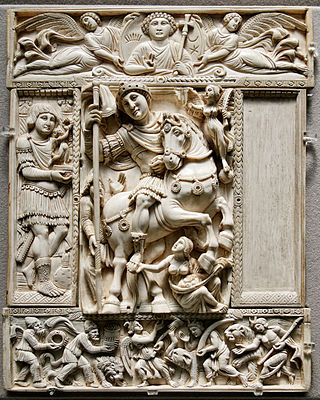
Late antiquity is sometimes defined as spanning from the end of classical antiquity to the local start of the Middle Ages, from around the late 3rd century up to the 7th or 8th century in Europe and adjacent areas bordering the Mediterranean Basin depending on location. The popularisation of this periodization in English has generally been credited to historian Peter Brown, who proposed a period between 150–750 AD. The Oxford Centre for Late Antiquity defines it as "the period between approximately 250 and 750 AD". Precise boundaries for the period are a continuing matter of debate. In the West, its end was earlier, with the start of the Early Middle Ages typically placed in the 6th century, or even earlier on the edges of the Western Roman Empire.

Anthony Clifford Grayling is a British philosopher and author. He was born in Northern Rhodesia and spent most of his childhood there and in Nyasaland. In 2011 he founded and became the first Master of New College of the Humanities, an independent undergraduate college in London. Until June 2011, he was Professor of Philosophy at Birkbeck, University of London, where he taught from 1991. He is also a supernumerary fellow of St Anne's College, Oxford, where he formerly taught.

Alan Douglas Edward Cameron, was a British classicist and academic. He was Charles Anthon Professor Emeritus of the Latin Language and Literature at Columbia University, New York. He was one of the leading scholars of the literature and history of the later Roman world and at the same time a wide-ranging classical philologist whose work encompassed above all the Greek and Latin poetic tradition from Hellenistic to Byzantine times but also aspects of late antique art.

Flavius Cresconius Corippus was a late Roman epic poet of the 6th century, who flourished under East Roman Emperors Justinian I and Justin II. His major works are the epic poem Iohannis, a panegyric called "Panegyric of Anastasius", and a poem in praise of the Emperor Justin II, In laudem Iustini minoris. Corippus was probably the last important Latin author of Late Antiquity.

Paula Fredriksen is an American historian and scholar of early Christianity. She held the position of William Goodwin Aurelio Professor of Scripture at Boston University from 1990 to 2010. Now emerita, she has been distinguished visiting professor in the Department of Comparative Religion at the Hebrew University of Jerusalem, since 2009.
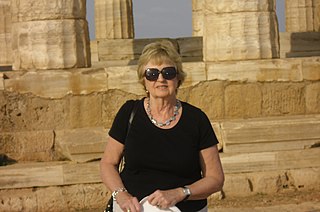
Dame Averil Millicent Cameron, often cited as A. M. Cameron, is a British historian. She writes on Late Antiquity, Classics, and Byzantine Studies. She was Professor of Late Antique and Byzantine History at the University of Oxford, and the Warden of Keble College, Oxford, between 1994 and 2010.

The growth of Christianity from its obscure origin c. 40 AD, with fewer than 1,000 followers, to being the majority religion of the entire Roman Empire by AD 400, has been examined through a wide variety of historiographical approaches.
In historiography, the Later Roman Empire traditionally spans the period from 284 to 641 in the history of the Roman Empire.

Paganism is commonly used to refer to various religions that existed during Antiquity and the Middle Ages, such as the Greco-Roman religions of the Roman Empire, including the Roman imperial cult, the various mystery religions, religions such as Neoplatonism and Gnosticism, and more localized ethnic religions practiced both inside and outside the empire. During the Middle Ages, the term was also adapted to refer to religions practiced outside the former Roman Empire, such as Germanic paganism, Egyptian paganism and Baltic paganism.

Love magic is a type of magic that has existed or currently exists in many cultures around the world as a part of folk beliefs, both by clergy and laity of nearly every religion. Historically, it is attested on cuneiform tablets from Mesopotamia, in ancient Egyptian texts and later Coptic texts, in the Greco-Roman world, in Syriac texts, in the European Middle Ages and early modern period, and among all Jewish groups who co-existed with these groups.
Parastaseis syntomoi chronikai is an eighth- to ninth-century Byzantine text that concentrates on brief commentary connected to the topography of Constantinople and its monuments, notably its Classical Greek sculpture, for which it has been mined by art historians.
The Royal Society of Literature Jerwood Awards for Non-Fiction were financial awards made to assist new writers of non-fiction to carry out new research, and/or to devote more time to writing. The awards were administrated by the Royal Society of Literature on behalf of the Jerwood Charitable Foundation.

The Jordan Lead Codices are a collection of codices allegedly found in a cave in Jordan and first publicized in March 2011. A number of scholars and a November 2012 regional BBC News investigation initially pronounced them fakes. As of 2017, both the Israeli Antiquities Authority (IAA) and the Jordanian archaeological department still officially regard them as forgeries.
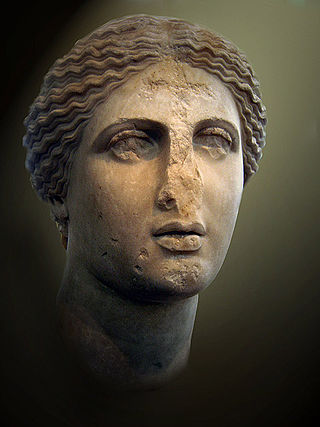
Persecution of pagans in the late Roman Empire began during the reign of Constantine the Great in the military colony of Aelia Capitolina (Jerusalem), when he destroyed a pagan temple for the purpose of constructing a Christian church. Rome had periodically confiscated church properties, and Constantine was vigorous in reclaiming them whenever these issues were brought to his attention. Christian historians alleged that Hadrian had constructed a temple to Venus on the site of the crucifixion of Jesus on Golgotha hill in order to suppress Christian veneration there. Constantine used that to justify the temple's destruction, saying he was simply reclaiming the property. Using the vocabulary of reclamation, Constantine acquired several more sites of Christian significance in the Holy Land.
This is a bibliography of literature treating the topic of criticism of Christianity, sorted by source publication and the author's last name.
Nixey is a surname. Notable people with the surname include:













